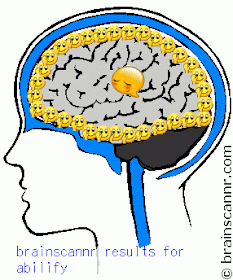brainscannr
free brain scans for everyone! Over thirty million served! 1
Let's start with some benzodiazepines!brainscannr results
This is your true brain, the emotions that run your life!Uh oh, not so great for lorazepam. How about for the name brand, Ativan?
There. Don't you feel more relaxed now?
Moving right along to some atypical antipsychotics. Let's start with olanzapine.
Hmm, no psychiatrist wants to see a strip of skulls down their patient's postcentral gyrus. Not to mention a frontal lobe that sleeps 16 hours a day.
But how about the name brand Zyprexa?
That's more like it... What a happy frontal lobe! And nothing but love for the motor strip. Who cares if the parietal-occipital region is sad, when there's such a big anterior party going on!
Let's go for another atypical, aripiprazole. Who can even pronounce that??
I'm so confused!! Am I happy? Sad? Afraid?
Abilify must be better, right?
Hi! Hi there, hello, hi... I'm a little shy, but I feel much better!
I'd like to end with midazolam, an amnestic benzodiazapine sometimes used before or during surgical procedures.
It is truly the perfect drug. C'mon Roche, you can't do any better than that. Why even try?
Oh, I see. You're not only happy on Dormicum, your entire brain is in love. But will you remember such bliss after you wake up in the orthopedic recovery ward?
Footnote
1 Not to be confused with brainSCANr, developed by Voytek & Voyek (2012):
The goal of neuroscience is to discover the relationships between brain, behavior, and disease. Using the Brain Systems, Connections, Associations, and Network Relationships (brainSCANr) engine, you can explore the relationships between neuroscience terms in peer reviewed publications.
Reference
Voytek JB, Voytek B. (2012). Automated cognome construction and semi-automated hypothesis generation. J Neurosci Methods 208(1):92-100.








One problem with this is that often the literature is shaped by fads: the fact that man papers "converge" on to something does not make this something more likely to be true. Most papers just regurgitate lame hypotheses from other papers. Although data mining can be useful in the hands of somebody with a good understanding of a particular topic, blind use of it is misleading at best.
ReplyDeleteUh, are you talking about the brainscannr smiley site on display here?? Ken Yasumoto-Nicolson explains:
ReplyDelete"what is this?
In June of 2007 Japanese breakfast television introduced a new web site, called nounai me-ka-, or Brain Insides Maker. I had a play with it, enjoyed it a lot, even blogged about it, and watched it become a raging success. I then got thinking about how to bring it to the English-speaking public. Since it used kanji to represent the brain states, I had to think of a different method that didn't require years of study in order to understand. Finally, I hit on the idea of making it smilie-based."
Or perhaps you commented on the wrong post?
I feel without an axial and coronal view it's hard to measure the emoticon metrics concurrent validity.
ReplyDeleteAlthough I have been able to apply it to the Myers-Briggs. The crying face, downcast face, glasses face, and rosy cheeked face perfectly correlates with the INTP designation a social media quiz gave me.
I'm ready for my diploma, Mister.
Hi Neurocritic, is there a way to contact you to ask you for your advice on psychiatric diagnosis?
ReplyDeleteNina - I'm not a clinician and can't offer a specific diagnosis, but if you send me another comment with your e-mail, I might be able to direct you to some appropriate resources. {I won't publish the comment with your e-mail address.}
ReplyDeleteThat site is... amazing. Good post. Look how accurate it is: it's like they've known me for years...
ReplyDeleteHa, ha! The one thing I didn't mention is that the algorithm is very sensitive to letter case. Here's Neuroskeptic (capital "N"), for instance.
ReplyDeleteHilarious. I also like the baby-brain option. My future baby will apparantly have a happy brain and a suspicious diaper.
ReplyDeleteHere are some other winners:
ReplyDeleteBrain
brain
...and the scariest of all:
neuro